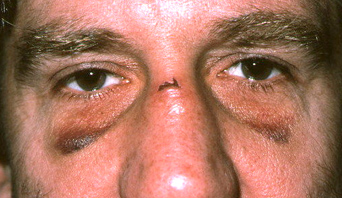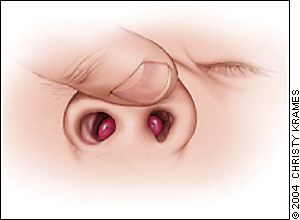It’s curious how many patients with broken noses come into the emergency room smiling. Usually they’re kids whose parents “just want to be sure.” In these cases not much happens. The kids love to see the pictures of their x-rayed faces, and, as long as nothing more serious has also occurred, they come back for a follow-up after the swelling has gone down.
At the other end of the spectrum, a broken nose may be part of a devastating facial injury. In that case it’s very unlikely that anyone is smiling, and there are other symptoms accompanying the nose injury.
A broken nose (aka nose fracture or nasal fracture) is the most common facial fracture, and it describes one or a combination of the following:
- There’s either a break in the cartilage or bone over the bridge of the nose.
- There’s a break in the structure that divides the nostrils, called the septum.
- There’s a break in the sidewall of the nose.

Signs and symptoms typically include a bloodied nose, difficulty breathing through the nose, deformed nose, pain, swelling and/or bruising around the eyes.
There are serious concerns that either may result from or appear together with a broken nose.
- Sometimes a collection of blood forms inside the nose. Failure to identify this can lead to further destruction of nasal cartilage, an abscess developing within the nose or the development of a permanent deformity causing breathing difficulty.
- The nose structure itself can collapse if not repaired, particularly in the presence of retained blood.
- Due to the nature of the force involved, neck injuries are often present with nose injuries.
If you have a broken nose, none of the above serious concerns should be a surprise. You should have symptoms that suggest the possibility of dangerous complications. Thus, it becomes important for you to know how to respond in the presence of a potentially broken nose.
- Breathe through your mouth.
- Lean forward to keep blood from going down the back of your throat.
- Apply ice packs or other cold compresses to your nose without applying excessive pressure. This will reduce swelling.
- Use acetaminophen (Tylenol) for pain. Other over the counter remedies may contribute to further bleeding.
- Don’t manipulate or try to straighten your nose. Doing so could dislodge blood or spinal fluid being kept in check.
- If a potentially serious injury has occurred, or if the injury involved a lot of force, avoid movement. A neck injury could be worsened with additional movement.
Here are some clues that you should make your way to an emergency room after a potentially broken nose injury:
- Clear fluid is draining from the nose.
- You have difficulty breathing.
- Neck pain is present or a large amount of force was delivered to the face.
- There is significant facial or nasal deformity.
- You have uncontrollable bleeding.
- You see a bulge inside either nostril.
Given that noses are a prominent part of our faces, be mindful to take simple protective measures when engaged in activities that could lead to broken noses. These are simple. Use protective headgear, seat belts and car seats, and avoid bar fights (or any other type of fight for that matter). That is a small price to pay for protecting your appearance!
Feel free to ask your SMA expert consultant any questions you may have on this topic.
Order your copy of Dr. Sterling’s new book Behind The Curtain: A Peek at Life from within the ER at jeffreysterlingbooks.com, iTunes, Amazon, Barnes and Nobles and wherever books are sold.
Thanks for liking and following Straight, No Chaser! This public service provides a sample of what http://www.SterlingMedicalAdvice.com (SMA) and 844-SMA-TALK offers. Please share our page with your friends on WordPress, like us on Facebook @ SterlingMedicalAdvice.com and follow us on Twitter at @asksterlingmd.
Copyright © 2016 · Sterling Initiatives, LLC · Powered by WordPress


